
Michelle Phippard is one of the netball world’s most decorated and respected umpires, but being honest, she said it wasn’t love at first sight. “I was a reluctant umpire. I’d started playing netball when I was about seven, and there was an expectation that you’d start doing your duty when you were 12. I wanted to coach and play, so I had to continue umpiring.”
In her late teens, Phippard was regularly given a ‘working over’ by some older women who played at the Knox Netball Association. While the experience would have put many off, it was a catalyst for Phippard to refine her officiating. She explained, “The competition was run by Bev O’Donnell, Shelley’s mum, and it included women who’d played at a much higher level in their youth.
“Their court craft, smarts and tricks of the trade really challenged me, and afterwards you’d have a chat with them over a cup of instant coffee. So learning how their mind worked started to hone my understanding of what was happening on court, and how I could do better. The mutual learnings and respect that exists between players, coaches and umpires is something that I’ve taken through my career.”
Netball was pivotal for Phippard when the family transferred to Switzerland in 2003 – her husband to work in agribusiness, and Michelle taking up employment as a lawyer with the United Nations. The sport became a crucial way to meet people, and to unwind from the stresses of her role relating to the war in Iraq.
She coached the Swiss team to their first victory, umpired the English SuperLeague, and played expat netball following a transfer to New York. Phippard said, “That was immensely challenging but also the most rewarding job I’ve ever had. From a personal point of view, netball was so important as I didn’t know anyone.
“Our team travelled to tournaments from Canada to San Francisco and Miami. Netball on the West Coast is dominated by Aussies, Kiwis and South Africans, while on the East Coast there are more Caribbean immigrants. It was so culturally different – they’d be firing up the barbecues after church, and cooking jerk chicken while we were playing.”
The brief overseas experience turned into an eight year sojourn, during which time Phippard notched up many of her 100 plus international umpiring caps. After her 2011 return to Australia, she’s continued to both work as a lawyer and an umpire. “It’s really important to have another profession,” Phippard said.
“Umpiring isn’t something you do for ever, because the toll at elite level, particularly for codes like AFL and NRL, that cop so much more than we do, is immense. You need another life to go to.”
Friendships made through netball have always been valued by Michelle Phippard. Suncorp Super Netball sidelines 2019. Image May Bailey
Supporting our umpires
Phippard is no stranger to the abuse that people in the sporting world can receive, something she believes has increased dramatically with the advent of social media. “You need to have strategies to deal with it. I try and stay away from it when I’m umpiring, as the public’s opinions aren’t necessarily right or valid, just because they are voiced.
“While it is your choice whether to look or not, I worry about our younger generation who have had a different upbringing with social media, and find it harder to disconnect.
“Sometimes the comments are nasty or personalised, and where it gets ugly is when people are sent direct messages. Jo Harten had it happen earlier this year which was horrible, and I’ve certainly had it happen in the past.
“There can be real depersonalisation around that – they are talking about people rather than figures, and potentially they, family members or friends might read it. Even comments that aren’t particularly nasty can be damaging if enough of them accumulate over time.”
While elite umpires are able to maintain physical separation from angry fans, and adverse comments are mainly online, Phippard shared her real concern for community based officials. “At that level, it’s in your face. Crowds are alongside the umpires, can be very confronting, and unfortunately incidences (of abuse) are increasing.
“It’s hard, because no one will umpire a perfect game. At the sub elite level – the grassroots and association – just like a less experienced player won’t get everything right, nor will a less experienced umpire. They might be doing the best job they possibly can at their stage of development, but expectations on them can be unrealistic.”
While Phippard states that netball umpires are very fortunate in how they are treated, and the relationship they have with coaches and players is strong, she believes there is room for improvement. Support, education, coaching and umpire pathways all need resourcing, while at grass roots, crowd control is a must.
“We have to support our young umpires in any code. They are so keen, but they are worried about parents or coaches being mean to them, and if they have a bad experience, they won’t continue.
“Umpires do work really hard, but at any level, we don’t have the same resources as players. At an elite level, that includes access to sports science and performance analysis, all the things that are a given for players.
“So while sport has become so much more professional over the years, the progress that players have made isn’t mirrored by the umpires, and that puts us at a disadvantage. For the players to do what they want to do, and are capable of doing, they need umpires that can match it, and the lack of investment holds us all back.”
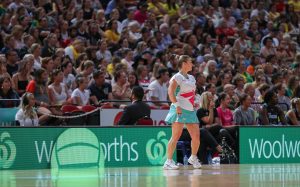
While elite umpires are afforded better protection and support than grassroots umpires, Michelle Phippard has experienced some of the trolling that exists across any sport. 2020 Bushfire Relief Game. Image May Bailey
Performance psychology
Coping with negativity makes the use of a performance or sport psychologist important for an elite umpire, while another critical talking point is managing self confidence. There are few public kudos for a ‘good’ game, but umpires can brutally pick themselves apart when they feel they haven’t met their own standards.
“It is important to address things that impact confidence,” said Phippard. “Recovery from mistakes is a big one. If something goes wrong and you’ve made an error, what skills do you employ to make sure one error doesn’t turn into five in a row because you are still worried about the first one?
“How do you maintain confidence when you are challenged? By players who are getting in your face, or criticism from the benches, or from nasty spectators? Or social media?
“It’s so important to have tools in the face of that. To be able to shelve it and keep going. To sit down later and dissect the error, rather than during the game.
“Umpiring is hard like that, because it’s about accuracy and decision making. You will make some mistakes, so you have to develop a framework where you accept that, and find a constructive way to address the mistakes. For me, it’s an opportunity to look at the decision, look at the why, is it a technique issue, is it my positioning, my vision, my timing, a rule interpretation issue? Did I interpret what the player was doing correctly, did I interpret their intent wrong? You can become caught in the negative, looking at what you did wrong rather than what you did right.
“So the mistake has to become an opportunity to learn, rather than an opportunity to beat yourself up, and that’s why performance psychology is invaluable.”
Phippard believes that a particularly difficult time occurs for umpires when they make the jump between stages – from state league to Suncorp Super Netball, or national to international matches, for example. There is added scrutiny and pressure, while fans watch using their own perspective and an unpopular decision isn’t necessarily a wrong one.
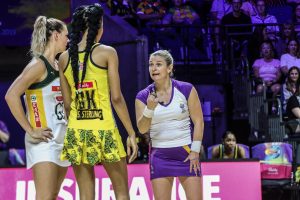
Michelle Phippard provides great clarity to the players she officiates, but says that maintaining self-confidence can be challenging. Image: Danny Dalton
Game changers
One of the biggest challenges that umpires face is the progression of the sport. Phippard, who started umpiring at the elite level in the late 1990s, has noticed a significant difference. “I look at those early games, and while they are still physical and skilled, there’s much less happening off the ball.
“There’s been a gradual increase in the intensity around the ball, but also the contests off it. People might think you’ve missed it, but you can’t possibly pick everything up, or the whistle would be going nonstop. The sport itself needs to prioritise what the most important things are that we call, and what principles we use to decide what we will act on.
“If you want complete accuracy in decision making there are other things that are lost, so we need to agree on what we want our game to look like, and what principles we want it to be governed by.
“We want athletes to play at speed, to full skill, with physicality, but we also want it to be safe and to be fair. What kind of umpiring achieves those objectives? That’s a discussion that international netball needs to have.”
While the interpretation of rules continues to differ around the globe, Phippard believes that video analysis is one of the most useful tools available to umpires. Used both for match preparation and robust post-match assessment, she’s found it crucial for her accuracy, decision making and cognitive learning.
“When I’m umpiring well, I’m very immersed in what I’m doing and everything is magnified in my mind. But when I watch the footage back later, the reliability of what I remember isn’t necessarily what I thought it was.
“I might realise that I wasn’t in the position I thought I was in, or the player wasn’t in a certain position. I might notice that I’ve had a blind spot on a certain area on court. Held ball is an example –time perception is altered because of where the umpire is and where they are moving to, and errors can be made.
“So video analysis helps me to understand my weaknesses and factors that impact my decision making. I can hone in on that and refine what I do – ‘I’m not happy with that – why not? Is it the timing of when I saw it, where I was standing, or something the player did that sucked me in?’ I can break it down to be more accurate.”
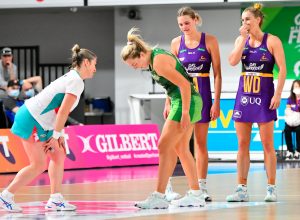
Umpire Michelle Phippard and player Jess Anstiss checking for blood, Suncorp Super Netball 2020. Image Simon Leonard
Game Day
While Australia’s elite netball umpires receive a retainer, match day payments, and allowances for travel, accommodation and food, they carry the costs of their own physical training.
Needing to maintain a high level of fitness, items like gym membership, specialist coaches, and health care provision such as physiotherapy treatment comes out of their own pocket. As umpires are part time and decentralised, there isn’t a coordinated approach to conditioning. “There is a lot of variance,” said Phippard. “We all have different needs and priorities.”
With over 20 years at elite level, Phippard’s pre and midseason training includes a mix of core strength, agility work, and general strength and conditioning. She does a lot of court work at club trainings – not just umpiring match play at the end of a session, but sideline work during long court drills.
“The team might not need you to umpire the drill, but I like to practice my positioning, my timing and movement, the pace of what the players are doing. For me, it’s entrenching the movement patterns, working on timing, and getting muscle memory happening. I like to try and get in a solid hour each time.
“However, in a training environment the players go at only around 75% of the intensity of a normal match, particularly in contested work, so it still isn’t a substitute for a real game.”
Having battled injury over the last couple of years – a combination of that and Covid restrictions kept her off the SSN court in 2021 – Phippard has worked extensively with a sprint specialist coach addressing her speed, power, agility and running technique.
“It was disappointing not to get back this year. I was doing Premier League and was happy with how I was going, but then Covid hit and there wasn’t a lot of choice. I’m hoping to umpire again in 2022, but that’s not entirely up to me as there are selection processes to go through.
“But the silver lining is that that it does create opportunity for other umpires – I’ve worked with a number of them over the years, and they’ve worked hard for a very long time to get to this level.”
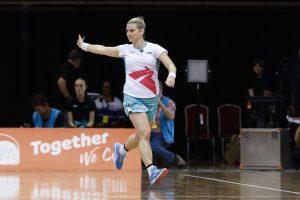
Specialist coaching to manage injury prevention is part of Michelle Phippard’s strength and conditioning routine. Suncorp Super Netball, 2019. Image Danny Dalton
One of netball’s most recognisable umpires, Phippard is known for being firm but fair, a good decision maker, and is blessed with a relatable human touch. She notched up her 100th test match back in 2018, and has a role of honour that includes multiple Commonwealth Games and World Championships. However, like other umpires, she enjoys it for the sense of achievement rather than economic gain.
International umpires receive flights and accommodation from the host country, and a per diem for meals, but otherwise aren’t paid. It can make taking a leave of absence from other work challenging. “You do often end up out of pocket,” Phippard explained. “You also need understanding employers to give you time off, while family or child care arrangements can be complicated.
“I was fortunate that my mum would fly interstate to help me out, but the sustainability of that is hard for many. When you add up everything involved to umpire just two or three games of netball (in a series), it often isn’t viable.”
Game day preparation starts midweek – umpires review their previous performance and set goals for the match. Phippard said, “After my review I have a clear picture of what I’m going to be focusing on. That’s not based on the team or players that I’m umpiring – it’s important to keep an open mind – but rather elements of my own umpiring. What I need to hone in on, any errors that I might have made, or timing that I could improve on.”
On the day itself, umpires have an individualised routine that differs little from the players – a physical and mental warm up, on court action, and time to refresh and refocus during the breaks. The game is followed by a review process, including feedback from the umpire’s coach.
Lengthy pinnacle tournaments can be taxing. Umpires don’t learn which games they will officiate until the night before or even the morning of the game. Matches, warm ups and warm downs, injury management, and practicalities such as finding food and washing uniforms take up most of the day.
“People might think the travel is glamorous, but you are basically going between hotel rooms and netball stadiums,” laughed Phippard. “At multi-sport events like the Commonwealth Games you can’t organise tickets to other events easily, as you don’t know your schedule.
“At the last Netball World Cup, I was sharing a twin room with Helen George – she was on morning games and I was on evening games. So she would leave while I was asleep, and I would return while she was asleep. We tried to keep quiet – not even boiling a kettle – and it does become a slog when you are trying to stay focused to the end.
“However, it’s an honour and there are many great moments – and you never take the opportunity for granted as another one might not come along again. So, just like the athletes, you should never leave thinking, ‘I wish I was better prepared or more focused.’”
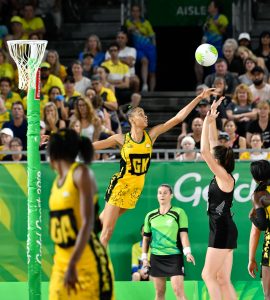
Michelle Phippard umpired her 100th international match during the 2018 commonwealth Games. Images Simon Leonard
Changing the rules
Phippard is part of a group – including umpires, former coaches and players – who sit on World Netball’s Rules Advisory Panel. They deal with questions around rules and interpretations – the global game varies slightly from country to country – but also have to understand how decision making impacts all levels of the sport.
When queries arise, Phippard said, “We first need to look at whether there’s an issue with a rule, or with the way it’s being umpired and whether that needs to be clarified. And if a rule is changed, it’s only done after we have a thorough look at how it might impact not only the elite level, but the millions of people playing grassroots netball.”
An example is the substitution rule, with a variation currently being trialled in the English SuperLeague. “At the moment players have to fake an injury and effectively lie about it to the umpire to make a substitution. That’s quite a glaring issue.
“If the rule was changed, it could be a real bonus to the lower levels as well, as kids could substitute mid quarter. That could reduce them standing around for long periods on the sidelines, and any resulting loss of interest in the game.
“So then we have to discuss, how do you implement it at all levels of the game, not just elite level? Is a stoppage to ask for a sub going to be easier to manage than a rolling sub, bearing in mind that you are going to have less experienced umpires, crowded sidelines, tape on the ground to mark interchange zones, and scorecard implications. There’s a lot to consider.”

Australian umpires will find it hard to gain their international accreditation due to recent Suncorp Super Netball rule changes. Michelle Phippard pictured with Josh Bowring and Marc Henning. 2018 Commonwealth Games. Images Simon Leonard
At the Australian level, 2020’s sudden introduction of new rules to the SSN could have been handled better, Phippard believes. “I understand that the people running netball have a responsibility to look at it from a different perspective, but the rule changes have had wider repercussions that weren’t considered, and that includes for umpires.”
“One of the major ones is that it has impacted umpire pathways here. At the moment we can’t test for international badges on SSN games, because there have been too many rule changes. So we don’t have the ability to screen and test upcoming umpires, and that is a serious issue.”
As a result the limited pool of international umpires could shrink through attrition, with fewer Australians – highly regarded in the industry – available in the future. That would be particularly problematic at pinnacle events requiring a large workforce.
Phippard also had other concerns. “There are umpires who are coming up from State League or ANL – they are not only dealing with a step up in standard, but dealing with different rules.
“Then, when they are umpiring, there are elements around an umpire’s timing and positioning that has to change for the five minutes of each quarter during the super shot period. For example, when the ball goes to the far side of the court, quite often the pattern of play working the ball into the circle is very different. The edge of the circle is getting clogged trying to stop the two point shot, there are deliberate infringements, and playing advantage is counterintuitive.
“At any other time of the game, an obstruction right near the post is an obvious penalty, but when a player is looking to feed it back out for a two point shot – what does an umpire do with that?
“Giving shooters the choice of whether to take a penalty in the one or two point zone then throws up anomalies like the deliberate obstruction of a wing attack by a player inside the circle. Normally that penalty would be taken inside the circle, but should we be giving the wing attack the choice? They might prefer to have the defender out of play outside the circle, rather than where the infringement happened.
“Having the two point rule apply for just five minutes per quarter is also difficult. Some coaches and players believe that those periods are umpired quite differently.
“And crucially, we don’t yet know what the wider impact on Australian netball from an international perspective will be. Any rule changes require both physical and mental change, and that’s true for players, coaches and also the umpires.”
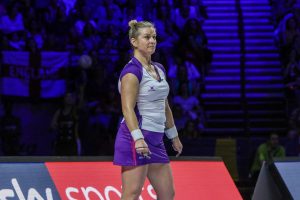
Michelle Phippard mid game. 2019 Netball World Cup. Image Danny Dalton
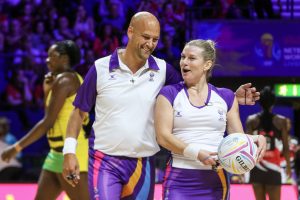
Umpires Gary Burgess and Michelle Phippard, 2019 Netball World Cup. Image Danny Dalton
